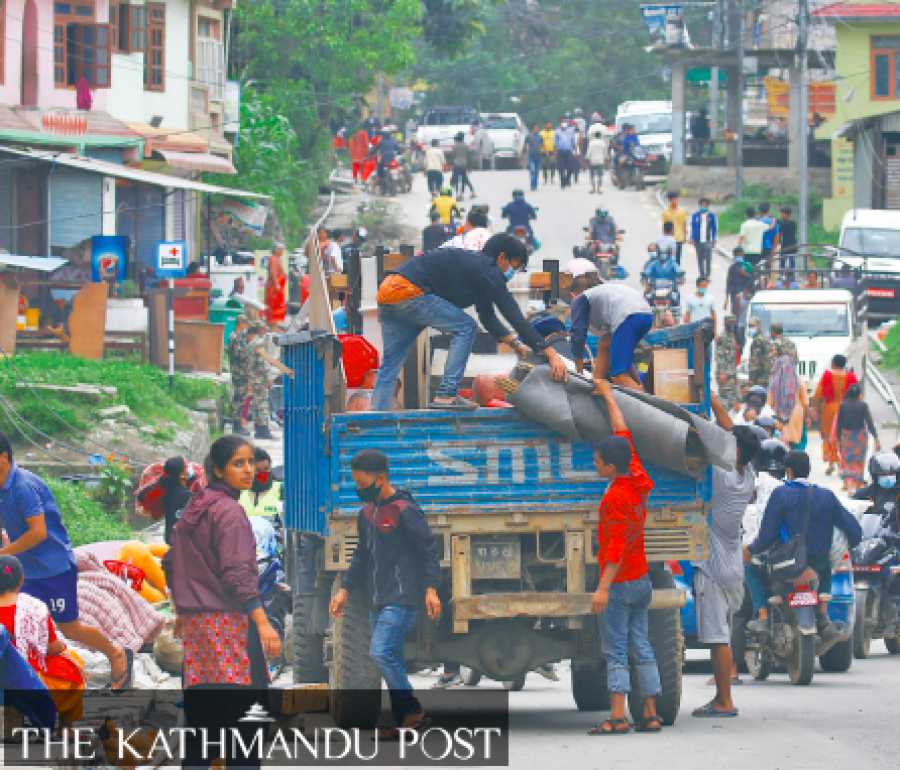Health
Families displaced by Melamchi floods refuse Covid-19 tests fearing separation
Around 600 people in Melamchi and 400 in Helambu are living in makeshift camps for flood displaced.
Arjun Poudel
On Friday, the Primary Health Center, Melamchi had planned to perform 600 antigen tests on the flood victims sheltering at the camps for the displaced at various places of the municipality.
However, only five people agreed to undergo testing.
“Most of the victim families, who are still in shock from the devastation caused by the floods, refused to undergo tests,” Gyanendra Ghorasaini, chief of the Primary Health Center, Melamchi, told the Post over the phone. “They fear they would be separated from their family members in the event of testing positive for Covid-19.”
Tests are not being performed in any of the camps for the displaced at Melamchi and Helambu, the two local units most affected by Tuesday’s Melamchi river floods, despite the high risk of Covid-19 outbreaks in such camps.
Doctors warned that temporary camps for the displaced people could turn into new Covid-19 hotspots while such camps are also highly prone to outbreaks of other seasonal diseases.
“Six people at the camps in Melamchi suffered food poisoning, caused by the unhygienic drinking water,” Dr Amir Awal, who has been deployed at Melamchi by the Dhulikhel Hospital, told the Post. “They suffered from diarrhoea and vomiting. The risk of Covid-19 outbreak is also high as the Covid-19 positivity rate in the district was up to 90 percent until a month ago.”
There are around 600 flood victims placed at different makeshift camps in Melamchi. Likewise over 400 people have been placed in four temporary camps in Helambu Rural Municipality.
“I don’t need to elaborate on the magnitude of the devastation caused by the floods and grief experienced by the victims,” said Sigdel. “We are not in position to counsel them. They asked the health workers if they were trying to separate them with their family members.”
They said they want to be with their family members even if some of them are infected.
Similar is the response of the displaced people in the Helambu Rural Municipality. Of over 400 displaced in Helambu, no one has undergone a coronavirus test yet. The displaced have been placed in makeshift camps made up of tarpaulins sheets at three places, and at a school.
Road access to the rural municipality remains cut off as several motorable bridges were swept away by the floods.
“We know that people residing in the camps are at high risk, as there is every chance of outbreak of the coronavirus and other seasonal diseases,” Gyanendra Sigdel, health coordinator of the rural municipality, told the Post over the phone. “Two ambulances of our rural municipality are stuck at Kiul [village] after the road was damaged. It can take months to repair the road.”
Both Ghorasaini and Sigdel said that people traumatised by the devastation, are in immediate need of psychological counselling, which is not available at the local health facilities.
“We have requested the District Health Office to send counsellors,” said Ghorasaini. “We might need more help if there is an outbreak of Covid-19 or other seasonal diseases at the camps.”
The Primary Health Center, Melamchi, which had been running a Covid-19 isolation center, has shut down the center and directed the staffers to disinfect the center to prepare it for treating other seasonal diseases.
“We may have to treat patients other than those infected with the coronavirus. So we decided to shut down the isolation center,” said Ghorasaini. “If Covid-19 infection is found, we will refer the infected to the isolation facility run at Dhulikhel Hospital’s outreach clinic at Bahunepati, four kilometer from Melamchi.”
Doctors say that the monsoon mayhem in the midst of the coronavirus pandemic has now doubled the risk of infections. There is no other option than to keep the displaced at temporary shelters, which, in turn, can turn into coronavirus hotspots, they say.




 11.84°C Kathmandu
11.84°C Kathmandu















